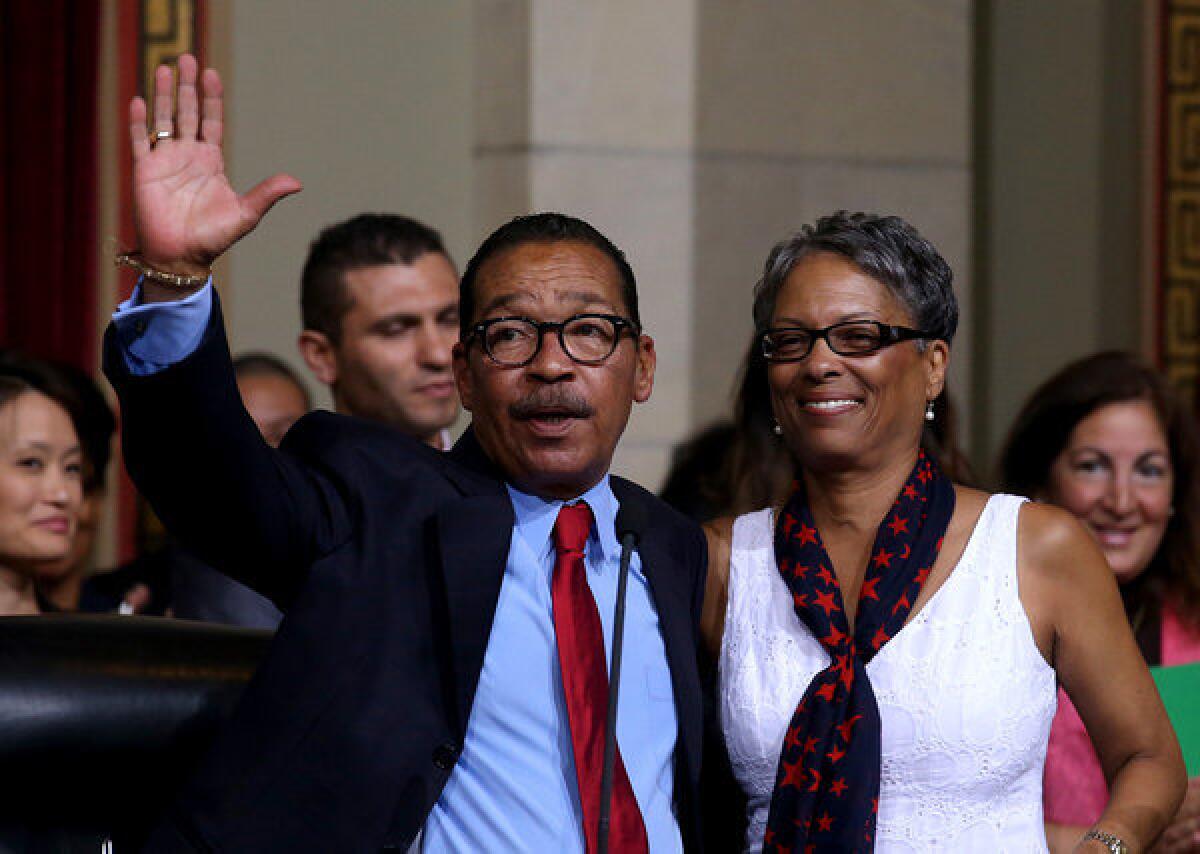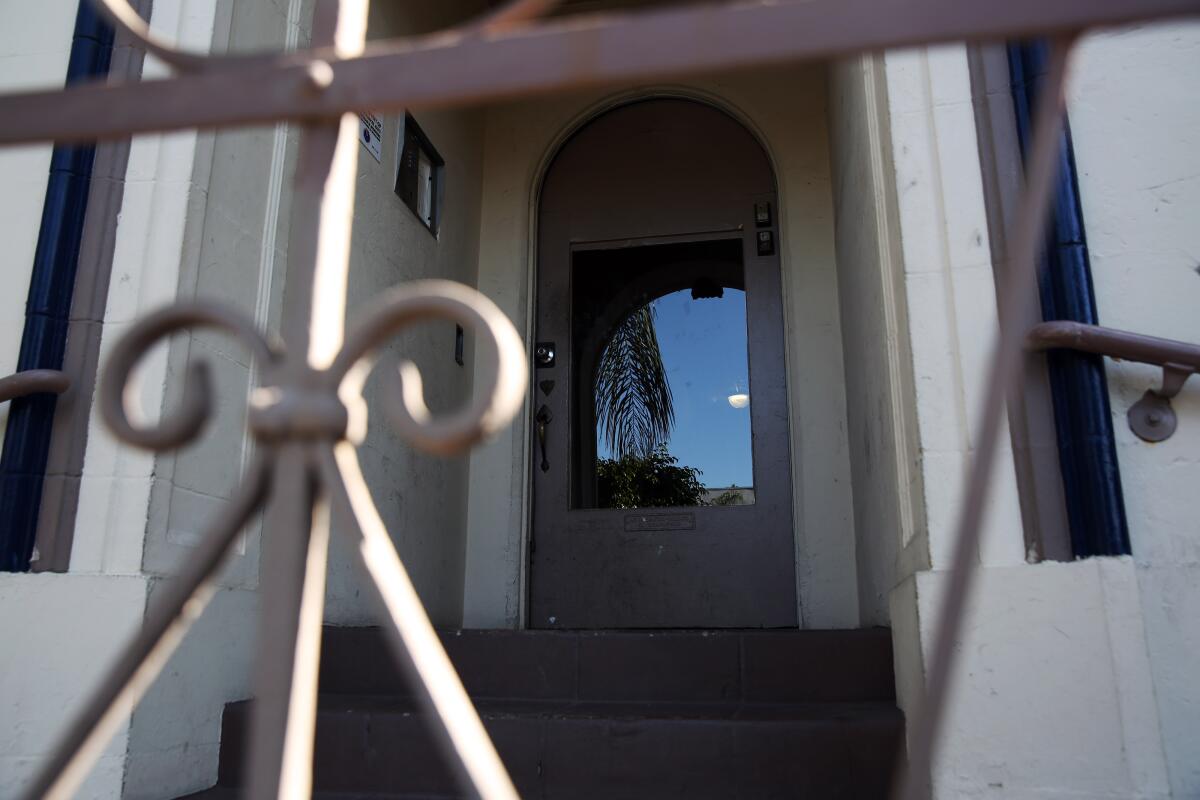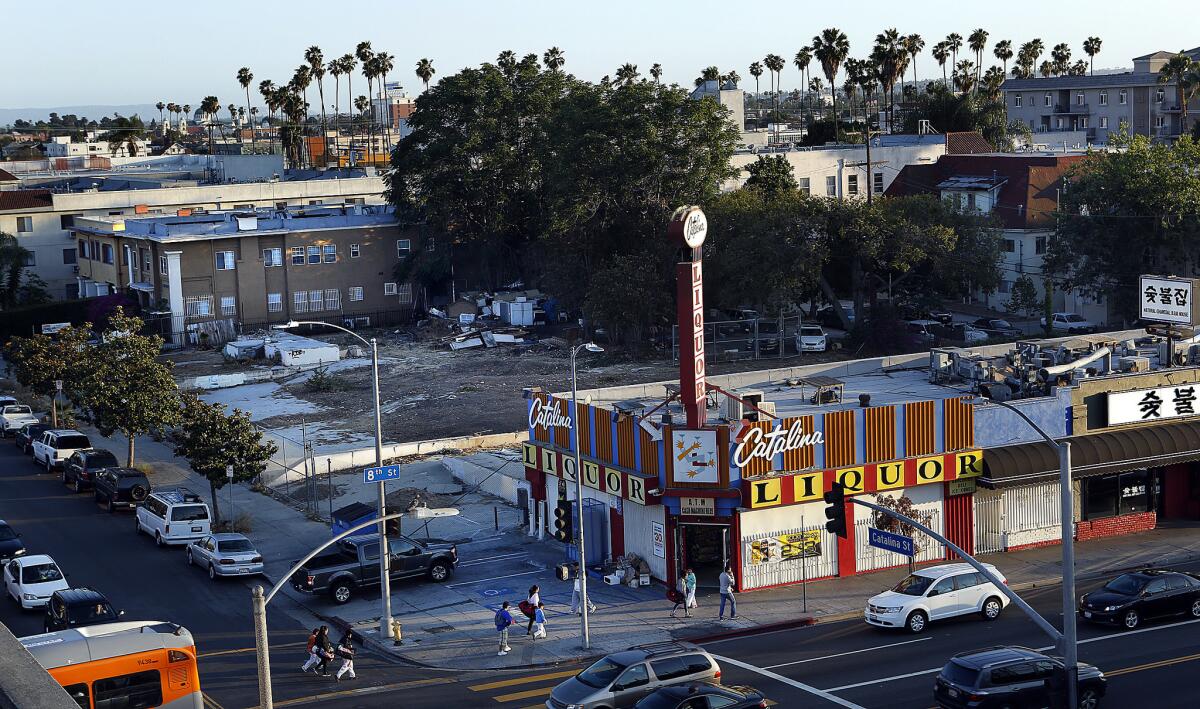Times Investigation: L.A. councilman Wesson helped apartment executives while his son received rent break

- Share via
Los Angeles City Council President Herb Wesson’s son received preferential treatment on his rent for years at an L.A. apartment building while his father helped the building’s executives win approval of a controversial high-rise, according to interviews and records reviewed by The Times.
Wesson helped shepherd the 27-story Koreatown residential tower through the city’s review process amid opposition from city staff and the planning commission. During the same period, his son was living in a building owned by Rosewood Corp., a company headed by tower developer Michael Hakim and one of his relatives.
The councilman’s son, Herb Wesson III, went more than five years without a rent increase at the apartment building on Rosewood Avenue, even as many other tenants saw their rent go up, a Times analysis of city records found.
Three other people who lived in the building at the time said they were aware that he was receiving a rent break while living in Apartment 4 — and that it was provided because his father is a councilman. One of them said Wesson III explained during a private conversation that he had received a discount because of “business his father was doing with the owners of the building.”
Legal experts said the rental arrangement should be investigated by the Los Angeles City Ethics Commission to determine what role, if any, Wesson played. Under city law, L.A.’s elected officials are barred from using their power to create “a private advantage or disadvantage, financial or otherwise, for any person.”
Experts on ethics laws said investigators should also look at whether Wesson III, who worked from 2013 until July as a mid-level aide to Councilman Curren Price, should have publicly disclosed a rental discount as a gift. Between 2013 and 2018, Wesson III did not report any gifts on the disclosure forms he was required to submit to the Ethics Commission.
Wesson, the council president, did not answer questions about whether his son had received a rent discount when his office was reviewing the planned tower.
Instead, an aide issued a statement saying Wesson “does not arrange rental agreements for his adult children.”
“Every policy he supports or opposes, every council action or vote he takes is based 100% on what is in the best interest of his constituents and the people of Los Angeles,” Wesson spokesman Edward Johnson said in an email.
Wesson III, 43, declined to be interviewed when approached by The Times at the Rosewood building, a two-story brick structure built in the 1920s.

Hakim, during a phone call with The Times, initially said he had “no clue” about whether Wesson’s son received a discount and said he has no financial interest in the apartment building.
Rosewood Corp. has owned the building since 1997, according to a spokesman for the Los Angeles County assessor. Over the past decade, the company repeatedly listed Hakim as its chief financial officer on state business filings. Hakim also signed a declaration in 2017 identifying himself as the owner of the property, according to a permit application filed at the city’s Department of Building and Safety.
After receiving written questions from The Times, Hakim said in an email that “the apartment has been rented at market rate.” Hakim did not respond to a follow-up question about whether he meant Apartment 4 or another unit where Wesson III currently resides.
“The first time I became aware of the tenant is when the LA Times inquired,” Hakim wrote.
Hakim, whose family’s companies own dozens of residential properties in L.A., also did not answer questions about whether Wesson III was spared rent hikes or how much the councilman’s son was charged in Apartment 4.
Earlier this year, a 450-square-foot studio apartment at the Rosewood building was advertised for $1,395 per month, according to online rental listings.
A new tenant
In December 2011, Apartment 4 of the Rosewood Avenue building received new tenants, according to a Times analysis of paperwork filed with the city’s housing department. Four months later, Wesson III registered to vote at that address, according to a spokesman for the Los Angeles County Registrar-Recorder/County Clerk.
Before that, Wesson III had been registered at his father’s home in Mid-City, voter records show.
The move to the Rosewood building came as Hakim was facing an uphill climb at City Hall. He and his company, Colony Holdings, had been seeking to build 269 apartments on a site where only half as many were allowed under the city’s zoning.
The City Planning Commission, then made up of appointees of Mayor Antonio Villaraigosa, recommended that the project be rejected. The panel concluded that the planned 35-story tower would be too big for the surrounding neighborhood, which was made up mostly of one- to six-story buildings.
Hakim lodged an appeal in 2009, and his request for a zone change and other city approvals was forwarded to the council’s powerful planning committee.
The developer soon turned to Wesson, whose support was crucial since the project was in his district, according to email correspondence between Hakim’s consultant and the council office. Council members usually defer to the representative of the area on development matters.
Before Wesson III moved into the Rosewood apartment, he had an issue that could have counted against him as a prospective renter. He owed the state and federal government tens of thousands of dollars in back taxes, according to liens filed with the Los Angeles County Registrar-Recorder/County Clerk’s office.
Chelsea Jade Clemons, who lived in the building for several years, said she asked the couple in Apartment 4 about their rent in 2012. Wesson III and his then-girlfriend told Clemons they received a discount because his family member had “some kind of government role” at the city, Clemons said.
“The reason they paid less rent was because of who his family was,” Clemons said.
Two others who knew Wesson III when he was living in Apartment 4 said they also were aware that he was receiving a rent break.
“It didn’t sit well with me, but I didn’t know what I could do about it,” said one former tenant, who asked to remain anonymous out of concerns of retaliation from the landlord.
Rosewood Corp. started submitting information to the city two years ago about its rents, through a new system called the rent registry. The documents are meant to help track prices in rent-controlled apartments across the city.
Rent records from 2017 showed that Rosewood Corp. had hiked the rent for nearly every eligible tenant in the 20-unit building during the prior 12 months. But at the apartment listed fourth on the registry, the landlord had not increased the rent since 2011, a period of more than five years.
Tenant names were not listed on the document. When The Times requested a copy, the city blacked out apartment numbers and monthly rents, citing privacy concerns.
However, The Times determined that the apartments were listed on the document in numerical order after interviewing six current or former tenants, who provided information about move-in dates and rent hikes that matched the contents of the document.
Wesson III was registered to vote at Apartment 4 from 2012 to 2018, according to county election officials. He and his wife also listed Apartment 4 as their home when they married in 2014, county records show.
Apartment 4 was spared from rent increases at a time when rents were surging across the city. Amy Storck, who lived in the Rosewood building from 2013 to 2017, said her rent was hiked three times over four years. When she moved out, the building’s managers tried to bill her for a missing light bulb, she said.
“The building management company charged me on every little thing they possibly could,” said Storck, who works in television marketing.
Five other Rosewood tenants — both current and former — said they routinely received rent hikes during the period when Wesson III was in Apartment 4. Only one other unit in the building had gone as long without rent hikes as Wesson III’s apartment, according to the 2017 rent registry.
Hakim did not respond to written questions from The Times asking about the information listed on the rent registry, including the lack of rent increases shown for Apartment 4.
Landlords are not required to charge the same amount of rent to each tenant. But experts said preferential treatment for the son of a politician raises legal and ethical issues, especially if it involves someone with business before that politician.
Loyola Law School professor Jessica Levinson, who served on L.A.’s Ethics Commission from 2013 to 2018, said any investigation into the rental arrangement would hinge on whether the council president worked with the developer of the Koreatown tower to secure a deal for his son.
Because Wesson III worked for a councilman during his time in Apartment 4, any rental discount could also fall under state and local rules about gifts to public officials. He was employed as a council aide from July 2013 to July 2019, according to a spokesman for the city’s personnel department.
State law generally prohibits local officials, such as council aides, from receiving more than $500 in gifts from each source in a particular year. In Los Angeles, officials also can be barred from receiving more than $100 in gifts per year from an entity with business at City Hall.
California’s Fair Political Practices Commission has advised officials in the past that rent discounts can count as gifts.
Development battle
While Wesson III was living in the Rosewood building, Hakim and his representatives worked with Wesson aides on getting the Koreatown project through the city’s lengthy review process, according to correspondence obtained by The Times.
Neighborhood activists had been bombarding City Hall with letters opposing the planned tower, at one point calling it a “35-story monolith with zero affordable housing.”
In 2012, two months after Wesson III registered to vote at the Rosewood apartment, an aide to Wesson informed a colleague that Wesson’s office was working with Hakim to revise, and possibly scale back, the size of the proposed tower.
The following year, Hakim said in another email that he had told a high-level Wesson staffer that an aide to the councilman should “always” be on hand at planning department meetings on his project.
Hakim’s father, Said Hakim, also weighed in, asking at one point to postpone a meeting since Wesson himself could not be present. Said Hakim is listed on state records as chief executive officer of Rosewood Corp., the company that owns the apartment building on Rosewood.
By the end of 2014, Hakim and his family had reworked the project, scaling it back eight stories and completing a new environmental review.
Planning department staffers again recommended that the planning commission reject the project outright, a rare occurrence at City Hall.
When the commission — this time made up of appointees of Mayor Eric Garcetti — took up the redesigned project, Wesson was firmly in favor. His planning deputy, Jordan Beroukhim, appeared before the planning commission and praised the developers as “pioneers” who would transform the neighborhood.
Despite Wesson’s backing, the planning commission unanimously rejected the project a second time. One commissioner compared the tower to a tumor. Another said that the city would violate the city’s planning rules for the area if they voted yes.
“We cannot make the findings to support this project,” said Commissioner Renee Dake Wilson. “It would be illegal of us to do so.”
Community groups brought up other concerns, saying they feared that construction of an “upscale” residential tower would prompt nearby landlords to hike their rents, pushing out low-income families. They said approval of the project would create a financial windfall for Hakim, dramatically increasing the value of his property by changing the zoning.

Despite those warnings, Garcetti threw his support behind the project, using the power of his office to lower the number of votes needed for the council to approve it. He had taken such a step only one other time, for a 352-unit apartment complex in Harbor Gateway known as Sea Breeze.
The developer of that project was later charged with bribery and conspiring to launder campaign money. He pleaded not guilty and the case is pending.
In May 2015, Wesson and the council voted unanimously to approve Hakim’s apartment tower. Wesson and his staff required that Hakim provide $1 million to the city’s affordable housing fund and $250,000 to a “community benefits” fund as part of the project.
Three community groups filed lawsuits challenging the city’s approval of the tower, pointing out that the council had disregarded the advice of two different planning commissions and department staff.
“The staff reports were all critical. The votes were all negative,” said Laura Lake, a board member with Fix the City, one of the groups that sued. “And yet Wesson and the City Council saved it.”
A judge sided with those groups in 2018, striking down the city’s approval of the Koreatown tower and saying officials had failed to properly analyze the project’s environmental impacts.
The council voted earlier this year to pay Fix the City $210,779 to cover its legal bills in the case. For now, half of the site remains an empty lot.
More to Read
Sign up for Essential California
The most important California stories and recommendations in your inbox every morning.
You may occasionally receive promotional content from the Los Angeles Times.












